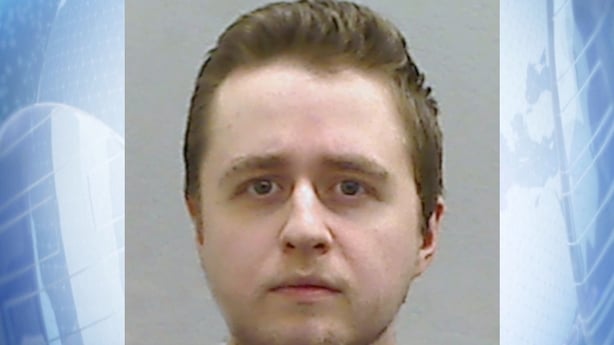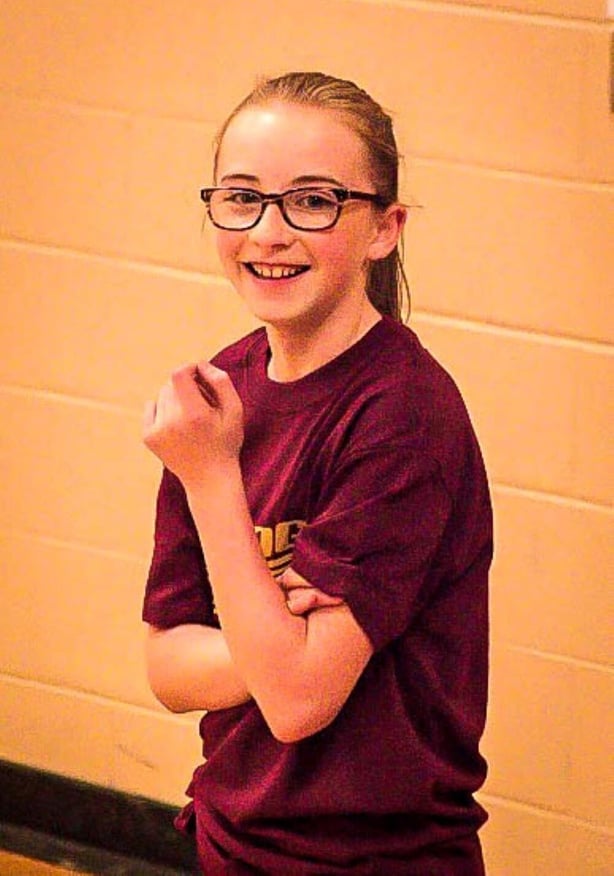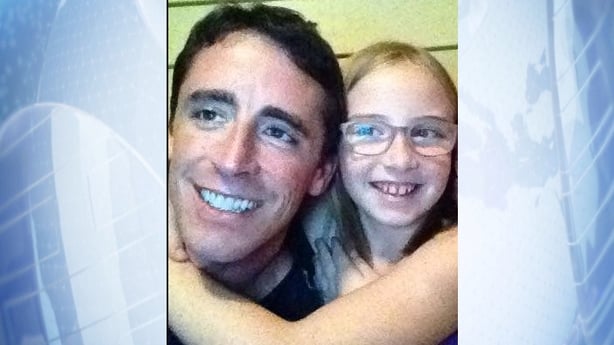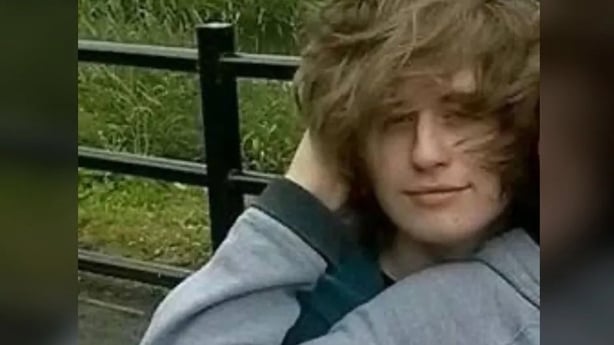WARNING: This article deals with very distressing issues and has graphic details. It is not suitable for all audiences. Reader discretion is advised.
Cimarron Thomas took her own life after being blackmailed by an online abuser.
In her last online conversation with Alexander McCartney, he threatened to share inappropriate images - images he had tricked the 12-year-old into sending him - if she did not send pictures of her younger sister.
He said the images would be sent to her father, other family members and friends.
Just over three minutes after the online chat ended shortly before 1am on 11 May 2018, Cimarron took her own life.
Eighteen months later, in January 2020, her heartbroken father Ben Thomas, a former US army veteran, also took his own life.
Family members said he lost the will to live and was overcome with guilt because his daughter had been able to access his gun.
A father and daughter in a small town in West Virginia in the US driven to suicide because of what prosecution lawyers described as the "depravity" of the actions of a serial child abuser using a computer in the bedroom of his home in Co Armagh.
Many more lives were destroyed.

The offences took place over a period from 2014-2019, starting when he was aged 17 and ending when he was 21.
They involve 70 victims, all girls who were aged between 10 and 16 at the time they were targeted via social media platforms, mostly Snapchat.
His victims were located all over the world, in Northern Ireland, the Republic of Ireland, continental Europe, the US, Australia and New Zealand.
The real number is believed to be much higher because some victims could not be identified, and others refused to come forward because of the nature of the crime.
A lawyer for Northern Ireland's Public Prosecution Service told a pre-sentencing hearing that in all likelihood "there are many, many more victims" and that "the harm he has caused is therefore unquantifiable".
The full details of this case could not have been reported if a judge had not lifted restrictions imposed by new sexual offences laws introduced in Northern Ireland in September 2023.
The legislation granted victims of sex crimes anonymity for 25 years, including after their death.
That restriction was challenged by a number of media organisations and a judge agreed that there was a strong public interest to lift the order in this case.
The full details of much of McCartney's criminal actions are too graphic and distressing to report.
The prosecution lawyer described his litany of crimes as "quite horrific" and told the court his victims had been "degraded and humiliated".
McCartney, a former computer science student at Ulster University, engaged in a practice known as "catfishing" - the use of a false identity to befriend and then exploit victims.
The pre-sentencing hearing was told that McCartney found and befriended young girls who were said to be struggling with their sexuality, preying on their insecurity.

Cimarron's sister told police that the 12-year-old had told her parents that she thought she might be bisexual.
McCartney sent his victims a photograph of a teenage girl pretending that it was a picture of him and then deceived them into sending compromising sexual images of themselves, usually of them topless.
The court was told he did this by a combination of flattery and persuasion, complimenting them on their appearance and reassuring them of their attractiveness.
When they sent the image, he then revealed his true identity and threatened them with exposure if they did not perform sexual acts on themselves and on some occasions younger children. Some of those he demanded were included were as young as three years old and five years old.
He told the children he would upload the image to the internet or send it to their friends and contacts on their social media accounts if they did not follow his instructions.
McCartney would send his victims images indicating their locations on Snapmaps, showing that he knew where they lived and went to school.
The investigation into his activities is believed to have been one of the biggest in the world, an international effort involving a number of police forces and law enforcement agencies.

He first came to the attention of police when a large number of electronic devices including four laptops, eight computer tablets and nine mobile phones were seized in January 2016 and were found to contain 3,490 indecent images.
McCartney was arrested on 4 February 2016 before being released on police bail.
His home was searched again in March 2018 and the following year, March 2019, a week after the PSNI had received a referral from police in Scotland alerting detectives that a victim of McCartney had come forward there.
The final search was conducted four months later, on 30 July, 2019, when he was again arrested and charged with a number of offences.
Despite the attention of the police and multiple searches of his home, prosecutors said that as time went on, there was an escalation in the seriousness of his conduct, in the form of "the depravity of the demands" he made.
Following his arrest in 2019, the PSNI contacted other police forces and law enforcement agencies in an attempt to identify the children whose images they had found in his possession.
US Homeland Security contacted the investigating team on 20 January, 2021, and informed them that a Snapchat user, Cimarron Thomas from West Virginia, had taken her own life "when she was online with the defendant". The chat conversation was recovered from McCartney's laptop.
When he first contacted Cimarron Thomas on 7 May 2018, just four days before her death, he pretended to be a girl called Sarah.
A transcript of sections of their conversations was presented to the court.
It revealed how he induced his victim to send a topless photograph and video of herself.
Fifteen minutes later McCartney revealed his true identity and told her: "I have your nudes and your face pic you are going to do as I say for tonight or else I will upload everything online for everyone to see including to everyone on your Instagram … Do you understand?"
He then demanded a series of sexual images of the child, insisting that she included her face.
A prosecution barrister told the court that "it appears that she was distressed and may have begun to cry".
At one point McCartney told her: "So dry your eyes and look cute for me."
Cimarron pleaded with him not to make her send him an image of her younger sister, but he was unrelenting.
When the young girl wrote that she would take her own life, McCartney replied "kk" – instant-messaging slang for ok.
He told her she had 30 seconds to decide if she was going to send the picture he had demanded, then counted down, "20, 15, 10, 0 times up". He then added that he was posting the images he had of her and that her father would be the first to see them if she did not send a photo with her sister within a minute.
"A minute is up. Well" were the last words he posted.
Cimarra Thomas did not reply.
Just over three minutes later, her nine-year-old sister found Cimarron. The victim's family, including her father, had no idea why she had taken her own life until they were contacted by police and informed about the online conversations with McCartney.
In a victim impact statement, the young girl's family said their lives will never be the same.
"We didn't get to see her graduate, walk down the aisle or have children. We have been robbed and our lives have been changed forever," they said.
The distress of other victims targeted by McCartney was also set out in the pre-sentencing hearing.

Prosecution barrister David McDowell told the court that some responses from the children were pitiful, as in their desperation, they begged him to stop and pleaded for assurances that their images will not be put on the internet or sent to their friends or family members.
"Many are crying and tell him they are shaking," he added.
"Some of his victims told him they would kill themselves as they pleaded with him to be left alone.
"Others, in desperation, threatened to harm themselves, some doing so on camera."
When one victim repeatedly said she would kill herself and that her mum was dying from cancer and had a heart defect, McCartney replied: "I do not give a sh*t about you or your mum."
Another young girl was told that if she did not comply with McCartney's demands, he would get people to go to her house and rape her.
In the pre-sentencing hearing, judge Mr Justice O'Hara was told that victim impact statements had also been prepared by some of the other victims detailing the ongoing effect of what McCartney did to them.
These included flashbacks, depression, anxiety, stress, manifesting itself in alopecia, shame, embarrassment, self-blame, loss of confidence in their appearance and difficulty in trusting others and the impact on relationships.
In some instances, parents of the victims wrote about the impact on themselves because of what had been done to their young children and their families.
Support and help is available if you have been affected by issues raised in this piece. https://about.rte.ie/ie/helplines/


